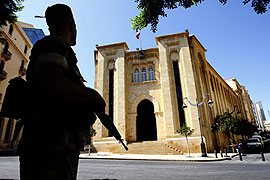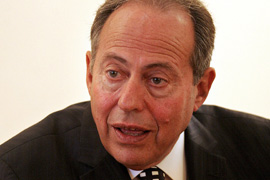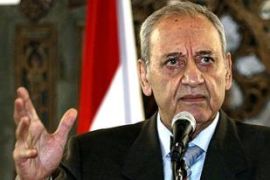|
|
“I hope the Lebanese will be united and will not make Lebanon, their homeland, another battleground”
Brutus, Lahore, Pakistan
Send us your views
|
A two-thirds majority is required in the first round of voting but in the event of a second round, a simple majority suffices.
The opposition wanted a deal on a consensus candidate to secure the attendance of its MPs.
Legislators of the March 14 coalition, who hold a slim majority, attended the parliament session anyway.
Al Jazeera’s Zeina Khodr, speaking from outside the parliament building in Beirut on Tuesday, said ruling coalition deputies turned up for the session but none from the opposition.
She said the security arrangements were unprecedented.
Compromise hopes
Berri had hinted on Monday that a vote would not take place but also voiced optimism that a compromise would be reached by the deadline when Lahoud’s term ends.
 |
Parliament was placed under tight
security for the first session [AFP] |
“By November 24, there will be a president of the republic who will have the approval of all the Lebanese,” he said.
Al Jazeera reported on Tuesday that Berri met Saad Hariri, leader of the Future bloc, before making the adjournment announcement.
Legislators have between September 24 and November 24 to choose a candidate to replace Lahoud, whose six-year term was extended by three years in 2004 through a Syrian-influenced constitutional amendment.
Michel Suleiman, the army chief, and Riad Salameh, the central bank governor, are seen as possible compromise choices.
Clashing objectives
Earlier, Marwan Hamadeh, MP and minister, said legislators from the March 14 coalition, who number 68 of the current 127-member house, intended to show up in force for the parliament session to mark their determination to end the crisis.
 |
Lahoud, the current president, is viewed by the
governing camp as a pro-Syrian figure [AFP] |
From the opposition camp, Mohammed Fneish, a senior Hezbollah official, had said that the party’s 14 MPs would be absent unless the differences were resolved.
Tuesday’s session, the first in nearly a year because of a long-running political crisis, came less than a week after Antoine Ghanem, a Christian MP from the Phalange party, was killed in a car bombing last Wednesday.
The March 14 camp, of which the Phalange party is a part, blamed the bombing on Damascus.
Ghanem was the eighth anti-Syrian politician to be assassinated since the 2005 murder of Rafiq al-Hariri, five-time prime minister, that led to protests and forced Syria to end 29 years of military domination in Lebanon.
The government had asked the army to take “all security measures … to guarantee the safety of MPs”, who have been living in hiding, many of them in a highly secure luxury hotel near the parliament.


